(Okay, if you really want to, you can get off to sleep and for meals, if you think it’s necessary.) 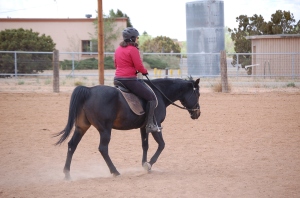 The truth is, if we want to have a long productive life that involves riding, then it requires some care of our bodies and the right training of our horses. It doesn’t mean necessarily that we want to go out every day and ride, but that it is in our future. I think there is a turning point in horse ownership where people wonder if they should have another horse, after their old horses get too old to ride and they themselves are feeling tired and not as motivated. One breeder I know said people have on average an 8-year interest in horses. Perhaps these are the years after they have their careers in place and maybe kids ensconced in their own activities or even after the kids have gone off to college. I have friends and clients who have not put off horse ownership through the raising children stage of their lives, and some who have put it off until they are retired. Another common scenario is the kids get a horse when they are young and then the horse is sold when the kid goes to college. For whatever reason, the interest in riding seems to peak in the teens, 40s and 50s and wane as we grow older, probably due to the aches and pains of aging and concern about retirement, etc. When people link having a horse to riding the horse, they may think that if the horse can’t be ridden anymore, then they don’t need a horse. However, one of the joys of horse ownership is also just having them and having a relationship with them, built on the Liberty Foundations.
The truth is, if we want to have a long productive life that involves riding, then it requires some care of our bodies and the right training of our horses. It doesn’t mean necessarily that we want to go out every day and ride, but that it is in our future. I think there is a turning point in horse ownership where people wonder if they should have another horse, after their old horses get too old to ride and they themselves are feeling tired and not as motivated. One breeder I know said people have on average an 8-year interest in horses. Perhaps these are the years after they have their careers in place and maybe kids ensconced in their own activities or even after the kids have gone off to college. I have friends and clients who have not put off horse ownership through the raising children stage of their lives, and some who have put it off until they are retired. Another common scenario is the kids get a horse when they are young and then the horse is sold when the kid goes to college. For whatever reason, the interest in riding seems to peak in the teens, 40s and 50s and wane as we grow older, probably due to the aches and pains of aging and concern about retirement, etc. When people link having a horse to riding the horse, they may think that if the horse can’t be ridden anymore, then they don’t need a horse. However, one of the joys of horse ownership is also just having them and having a relationship with them, built on the Liberty Foundations.
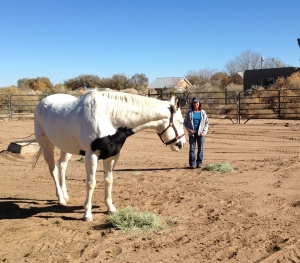
Here are some tips to make riding for the rest of your life possible, enjoyable and fun:
1) Have a gentle, dependable horse who is a ready partner. By this I mean a horse who you know will want to be ridden, and for whom you’ve determined doesn’t have physical or psychological restrictions that prevent him from being ridden.
2) Ride with a saddle – do not ride bareback unless you feel absolutely certain of your horse and your own balance.
3) Have a regular exercise program (yoga is great).
4) Receive regular bodywork.
5) Maintain a good diet with plenty of vegetables and limit processed food. Drink plenty of water.
6) If you have physical restrictions, ride only for short periods of time. There have been times in my life when I could only climb into the saddle for 5 minutes at a time, and I needed someone else to cinch my horse. That did an enormous amount for my mental health.
7) Ride as much as possible without resistance. The use of the deep seat, elongation through thighs and torso to direct the horse will save on you needing to direct with the reins. Connected On Line work (offered after Liberty Foundations have been established or woven into the Foundations) will help your horse find his own lightness. Your horse will love you for it. Ride with as little restraint as possible to still be safe. Remember the horse has to be a willing partner; a shank bit isn’t going to help you with a horse who doesn’t want to listen to you. 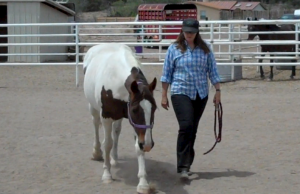
8) Check your energy and your dimensions for any blockages or weakness. This means feel your center line, up/down, side-to-side, and forward/back energies. Just your awareness of this can make a difference in how you are with your horse and how he reads you. If you need clarification on this, please contact me. We work on this in clinics, private consultations and lessons.
9) Be safe. Always check in with your horse about whether this is something he or she wants to do. Match the activity to your own and your horse’s abilities.
Although these tips may seem simplistic to some, they are really essential to keeping fit enough to be on horse back. Horseback requires your body to really be in sync with the horse’s body; you are not a passenger. You may have had experiences in your life where you were riding in a dude string and really were a passenger. The reason for this was dude string horses are very often “checked out.” They have to be to put up with all the different kinds of riders who know nothing. Even though “checked out” appears to be desirable, these horses can explode if put in other situations out of their comfort zone, because they have never been listened to and never been “met.” No one has asked their opinion on anything, essentially they have been treated as slaves. Most horse accidents occur because people are not clued in to something the horse is trying to tell them.
So when I recommend a gentle, dependable horse I mean one who does not carry this baggage, enjoys what he’s doing and can hold a shared vision of what you can do together. (You can work with a horse with this type of baggage and bring joy to them, so they will eventually let go of their trauma.) This is the “centaur relationship” that we work towards in liberty coaching, the place we want to come to in our “Open Bond, On Line and On Board” perspective.

Bill Dorrance, the brother of Tom Dorrance, is depicted in his book, True Horsemanship Through Feel, with a contraption that hung from the rafters of his barn that lowered his saddle onto his horse. This allowed him to get on his horse when he was in his 90s. I love this photo, as it shows sheer determination to continue doing something he loves even though at that age it took a tremendous amount of effort and ingenuity.
If you can’t ride for some reason, here’s tip # 10): imagine yourself riding. I had a client with serious health issues that prevented her from riding. She had ridden most of her life, done endurance rides, and found herself in this situation where she could not get on her horse safely. We worked together with visualizations that gave her great joy because she could feel herself on horseback again, feel the soft fur of her horse’s neck, the rhythmic movement of his body. Since I knew some of the trails she had ridden, we could share geography in visualizations. She still owned her horse so she could look out her window and watch him and feel this again. We also of course worked on the innate health in her body, bringing her greater ease that helped fuel the visualizations.
Visualizations are valuable for so many other parts of being with horses and riding, including the aforementioned dimension work, to help us keep quiet in ourselves and convey that to our horses.
For many of us, being with horses and riding are part of our daily rhythms and something we want to continue as long as humanly possible. We are part of a greater herd when we are with horses, in a kind of exchange that nourishes us, just as cooperative herd members do this for one another and help each other thrive.
****
(copyright: Susan Smith, OrthoHorse)
Services: Bodywork (Ortho-Bionomy for people, Equine Positional Release/Equine Ortho-Bionomy): private sessions, tutorials, phone consultations, distance healing communication and gift certificates
Liberty Coaching: clinics, mini-clinics, workshops, private and semi-private sessions, tutorials, consultations: by appointment: 505.501.2478 or emailing susansmith@orthohorse.info Winter Lessons – semi-private, private and small group sessions. Scheduling now. Contact me for details.
New on the schedule for 2014:
February 8, OrthoHorse Tutorial — Arrowhead Ranch, Santa Fe, Susan Smith, Advanced Registered Practitioner Ortho-Bionomy 9:30 a.m.-12:30 p.m. If this one fills up we may open an afternoon session.
March 1-2 Horses at Liberty Foundation Training Weekend Clinic, DeLand, Florida. Early Bird Deadline for Discount: February 7th! Book your spot today! Contact Anne Daimler, tdaimler@cfl.rr.com (386-822-4564) or myself for registration and information. Space is limited. OrthoHorse Tutorial also offered before the clinic: February 28 (see flyers below).An afternoon Tutorial may be offered by popular demand. Private bodywork sessions and lessons are being scheduled now.
April 5-6 Spirit Horse Ranch Liberty Foundations Clinic, Jones Oklahoma, Presented by coaches Ruella Yates and Susan Smith. Contact Ruella Yates ruella@libertyfoundations.com, (405-771-4274) or myself for registration and information. Space is limited. Private bodywork sessions and lessons are being scheduled now.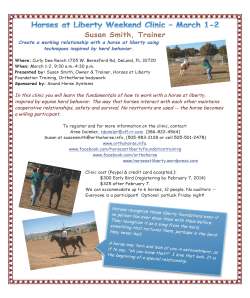




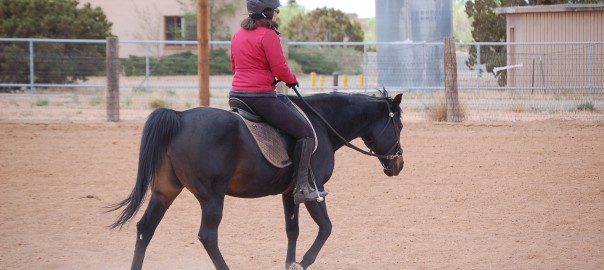
Great post. Awesome tips!
Thank you! Happy trails…
Following your tips, Susan, for a lifetime with horses! Thank you!
Ruella Yates
Wonderful article Susan…hope all is well with you too… <3 Geerteke
So good to hear from you, Geerteke, thank you too! Susan
I so love this post. Smart articles like this become ever more important for us horse addicts who are, ahem, somewhat older now, have a few body issues going on, and who don’t bounce so well when we hit the ground any more! Thank you for your sensitivity, Susan. Wonderful article!
Thank you, Leta!